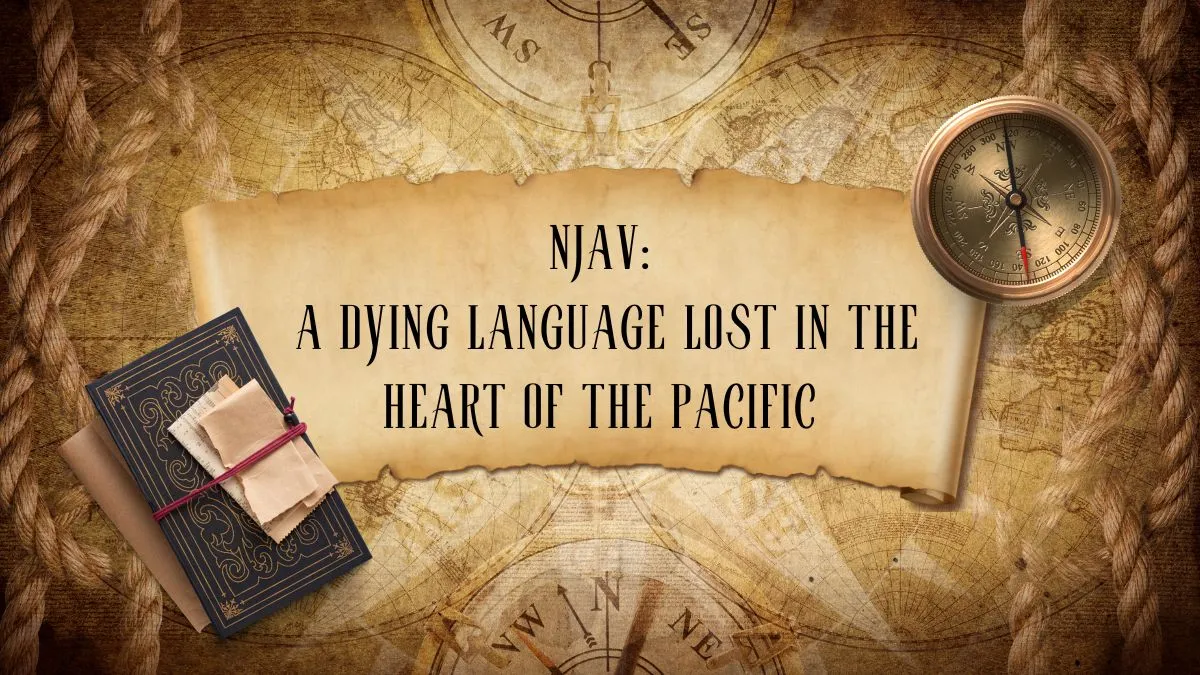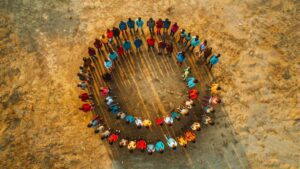GENERAL
Njav: A Dying Language Lost in the Heart of the Pacific

Deep in the Pacific, hidden on Malakula Island, a language is fading. Njav, once spoken fluently, is now struggling to survive. It belongs to the Austronesian family, yet few have even heard of it. Vanuatu, the country it calls home, is known for having the most languages per capita. But many of them, including Njav, are disappearing fast. Modern life, dominant languages, and migration are all playing a role. The younger generation? They prefer Bislama, English, or French. This language is at risk of vanishing, just like many indigenous tongues before it. Why does this matter? Because every language holds history, culture, and identity. Once it’s gone, it’s gone forever. Can Njav be saved?
The Origins and History of Njav
Njav’s story begins centuries ago. It evolved as part of the vast Austronesian family, spreading across Malakula Island. The language was once a vital thread in local life. It carried myths, passed down wisdom, and shaped the identity of its people. But history hasn’t been kind. Colonization brought English and French. Trade and migration introduced Bislama. Bit by bit, Njav started to fade. Fewer parents spoke it to their children. Elders, the last true keepers, are now passing away. The language is becoming a whisper, a forgotten voice in a rapidly modernizing world. If steps aren’t taken, this language might soon exist only in old stories, barely remembered by the next generation.
Geographical Distribution: Where is Njav Spoken?
Njav exists in the heart of Malakula, one of Vanuatu’s many islands. But even there, its presence is shrinking. A few small villages still hold onto it, but the numbers are low. Some say only a few hundred speakers remain. Others argue it’s even less. The real problem? Younger generations are shifting away. Schools don’t teach Njav. Daily conversations are now in Bislama. Even within families, the language is fading. The result? A slow but steady decline. If this trend continues, this language could disappear within a few generations. That’s the reality. A language that once thrived in Malakula may soon be nothing more than a memory.
Linguistic Features of Njav
Njav isn’t just a language. It’s a unique way of thinking. The sounds? Unlike English. The sentence structure? Different. Many of its words hold deeper meanings, tied to nature and tradition. Take its phonetics—some sounds don’t exist in global languages. Grammar? It follows its own rules, distinct from Bislama or French. Vocabulary? Rich, filled with words for local plants, customs, and myths. But here’s the problem. Without speakers, these linguistic gems vanish. Every lost word erases a piece of history. Reviving this language isn’t just about saving speech. It’s about preserving a worldview, a way of life passed down for generations.
The Cultural Significance of Njav
This language isn’t just spoken. It’s woven into culture. It tells stories of ancestors, explains traditions, and connects people to their roots. Rituals? Many are performed in Njav. Folktales? They lose meaning when translated. The language is the heartbeat of a community. Without it, something crucial is lost. The new generation, though, is drifting away. They speak Bislama at school, English in business. Njav is heard less and less. But can a culture survive without its language? That’s the big question. When Njav disappears, it’s not just words that vanish. It’s identity, heritage, and history—all at risk of being forgotten.

Factors Leading to Njav’s Decline
Languages don’t just die. They fade, slowly, generation by generation. Njav is no different. The biggest reason? Globalization. Bislama dominates daily life in Vanuatu. English and French shape education and business. This language is left behind. Urbanization makes it worse. Young people move to cities. They stop speaking Njav. Even in villages, parents don’t pass it on. Why? It’s easier to teach kids a language with more opportunities. Schools don’t support Njav either. No classes, no books. Without active speakers, the language shrinks. One day, it might disappear completely. And with it, a unique part of Vanuatu’s identity.
The Role of Bislama and Other Languages in Vanuatu
Bislama is everywhere in Vanuatu. It’s the language of trade, school, and government. English and French? Also strong. That leaves little room for Njav. It’s the same story across the Pacific. Small languages struggle to survive. Why? Because bigger languages offer better opportunities. Kids want to learn what helps them in life. This language , sadly, isn’t seen as useful anymore. The result? A slow but sure shift. Fewer Njav speakers every year. More people switching to dominant tongues. Once a language reaches this point, saving it becomes hard. But not impossible.
Efforts to Preserve and Revive Njav
Can Njav be saved? Maybe. But it takes effort. Some locals are trying. They record stories, document vocabulary, and teach kids at home. Linguists are stepping in too. They study Njav, writing down its grammar, capturing its essence. But it’s not enough. Schools need to include it in lessons. Digital tools can help—apps, online dictionaries, recordings. Community events can keep it alive. The goal? Make Njav part of daily life again. Because once a language is gone, bringing it back is nearly impossible. The time to act is now.
The Future of Njav: Can It Be Saved?
This language stands at a crossroads. It could disappear forever. Or it could be revived. The choice depends on action. If nothing changes, the outcome is clear—Njav will die out. But with effort, hope remains. Look at Hawaiian or Māori. Once endangered, now spoken again. Njav could follow that path. But it won’t happen by accident. People must care. Schools must teach. Families must speak. If they don’t, Njav will soon be history. And the world will lose another beautiful, unique language.
Why Should the World Care About Njav?
Why does Njav matter? Simple. Every language holds wisdom. Each one carries unique ways of seeing the world. This language has words that don’t exist elsewhere. Stories that have never been written down. If it disappears, we lose all that. Language loss isn’t just local—it’s global. Every time a language dies, the world becomes a little less diverse. A little less rich. That’s why Njav’s survival matters. Not just for Vanuatu, but for everyone. Because once a language is gone, there’s no bringing it back.
Conclusion
Njav is in danger. It’s slipping away, fading into history. But there’s still time. Efforts are being made, but they need support. Language preservation isn’t just about words. It’s about identity, culture, and knowledge. If this language disappears, it takes centuries of history with it. The world has lost enough languages already. Let’s not add Njav to that list. The fight to save it isn’t just for Vanuatu—it’s for all of us. Because when a language dies, humanity loses something it can never replace.
-

 BIOGRAPHY9 months ago
BIOGRAPHY9 months agoBehind the Scenes with Sandra Orlow: An Exclusive Interview
-

 HOME1 year ago
HOME1 year agoDiscovering Insights: A Deep Dive into the //vital-mag.net blog
-

 HOME1 year ago
HOME1 year agoSifangds in Action: Real-Life Applications and Success Stories
-

 BIOGRAPHY1 year ago
BIOGRAPHY1 year agoThe Woman Behind the Comedian: Meet Andrew Santino Wife




























